If you're planning to start an affiliate marketing program for your WooCommerce store, you'll eventually have to select an affiliate plugin. On what basis should you make this selection? Obviously, your objectives and priorities are important.
However, before we go there, you would be wise to embrace a simple truth: the success of an affiliate marketing program depends entirely on your affiliates. Before you start thinking about your wants and needs, you'd better understand theirs. Otherwise, your affiliate marketing program will go nowhere.
What Do WooCommerce Affiliates Want?
Money

That's the obvious answer. This starts with commission rates but may also include other aspects of a commission program, such as:
- Commission tiers, i.e., increasing the commission rate as an affiliate's sales reach certain levels;
- Recurring commissions, where an affiliate is paid on every subsequent purchase or subscription renewal by a customer;
- Lifetime commissions, where an affiliate is paid for every purchase the customer ever makes, even if it's not related to the first purchase;
- Indirect commissions, where an affiliate plays such an important part in the promotion of a product (such as an influencer) that a commission is paid on every sale of that product even if the affiliate has never had any direct contact with the customer;
- Auto-referral commissions, meaning commissions paid on purchases made by affiliates themselves;
- Lead commissions, where an affiliate is paid just for generating a lead even if that lead does not result in a sale;
- Multi-level commissions, where an affiliate is paid commissions on sales generated by affiliates recruited by the first affiliate;
You may not want to support all of these commission types, but your affiliate plugin should have the flexibility to do so.
The other aspect of money is getting paid. Affiliates can be touchy about that. You don't want to make them jump through hoops to get money they've already earned.
There is no shortage of payment platforms to help you do this, including these popular choices:

The question is whether your affiliate plugin will integrate with the payment platform you prefer.
Promotional Support
Imagine that you're just starting to sell a new product line. Would you like to create promotional material from scratch, or would you appreciate the product manufacturer/distributor helping out?
Affiliates feel the same way. Specifically, they want:
- Premade banners, images, infographics, text, videos, and social media posts;
- Personalized landing pages and links;
- Endorsements or testimonials;
- QR codes;
- Special promotions, offers, and giveaways, preferably implemented via coupons that they can distribute;
You may not want to generate all of this material, but again, your affiliate plugin should let you do so if you choose. Not all plugins will.
For more information on this topic, see 11 Types of Affiliate Creatives that Will Help Your Affiliates Excel.
Clear Data on an Affiliate's Activities
Imagine that you're an affiliate who has created scores of blog articles, product pages, and videos to promote a line of products. You have set up your website so that you know when visitors click a link to go to the product site, but you have no idea what happens after that. Wouldn't you want to know?
Of course, you would. Affiliates want to see their scorecard just like every other salesperson on the planet. And not just a scorecard. They want a dashboard or portal that puts all their information at their fingertips, as Solid Affiliate does here:
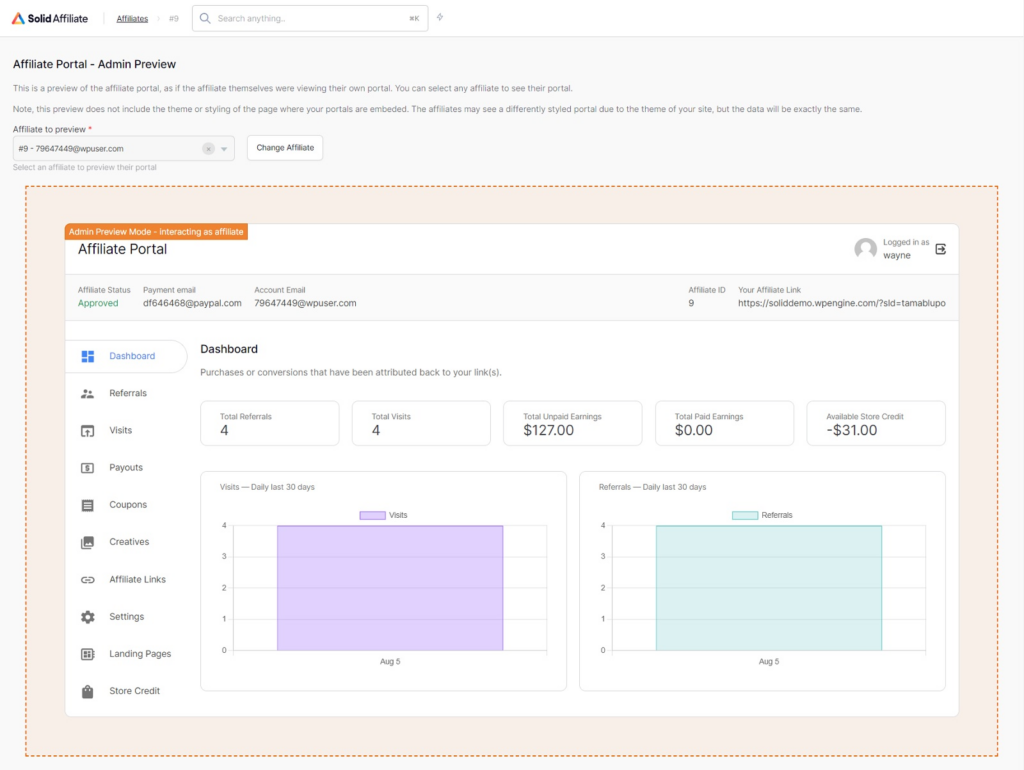
Note, in particular, how there are tabs down the left-hand side for everything we've discussed to this point.
Affiliates using this type of dashboard or portal won't get frustrated because of a lack of information. On the contrary, they'll be motivated to go back on the web and rack up some more sales!
Administrative Support
If you've created the ideal commission structure for affiliates, provided them with all the promotional material they need, and given them access to a dashboard or portal that answers all of their questions, the only possible remaining request they could have is for a little administrative support.
This requires either a support ticket system or at least an email address that affiliates can contact, similar to how you provide customer support.
If you've already covered 99 % of their needs, it's unlikely they'll request that support very often. If they do, that probably means you still have some holes to fill. But in case something goes wrong, it's still nice to have a convenient way to get help. This is how you close the loop.
What Do Store Owners Need From a WooCommerce Affiliate Plugin?
Now it's time to turn our attention to your needs.
Command and Control
The first and most important feature you should seek from your WooCommerce affiliate plugin is complete control over which affiliates are selling your products.
This starts with the affiliate approval process. No matter how tempting, you should not automatically approve affiliates, as that will expose you to fraud and other bad behavior. To build a quality affiliate marketing program, your plugin should provide you with a nice, clean interface where you can manually approve each affiliate that applies to your program:
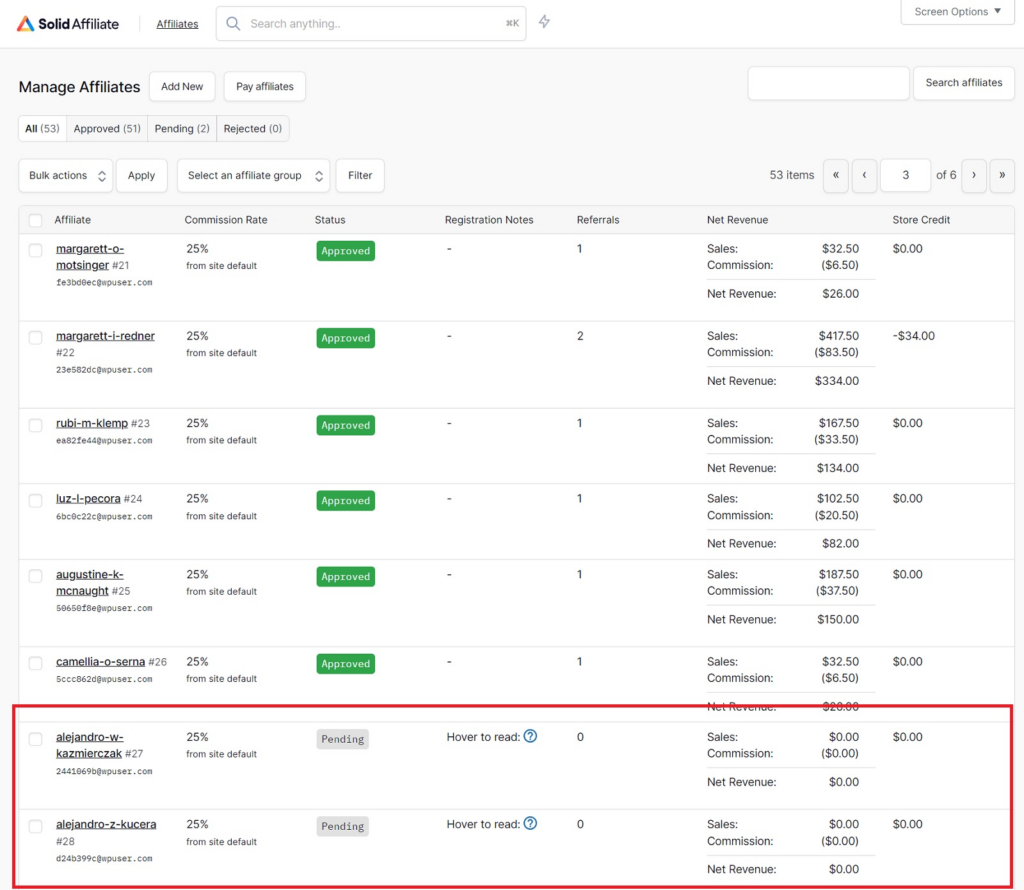
This same interface should give you the ability to deactivate affiliates.
Finally, a good affiliate plugin should offer you some form of fraud detection and prevention. This can range from sophisticated fraud detection algorithms available on hosted platforms such as ReferralCandy and Tapfiliate to smart referral tracking that is not based on URL links (see AffiliateWP for an example) to the simple ability to block suspicious URLs from generating visits or placing orders on your system.
Put another way, you want an affiliate plugin that helps you ensure that:
- Only quality affiliates represent your company/products.
- All orders are legitimate.
Some plugins have put a lot of thought into this. Some, very little.
Clear Data on Affiliates and All Affiliate Activity
Pretend for a moment that you have signed up 200 affiliates to help sell your products. Basic common sense tells you that you need to be able to differentiate between top performers and laggards so you know where to put your effort. Who deserves to be granted special promotions or rewarded with special bonuses? Who needs a little more encouragement and support to maximize their sales? Who is a giant waste of time and needs to be pruned from your affiliate marketing tree?
Even a simple report like this, especially with the filter capability at the top, can help you quickly separate the wheat from the chaff:
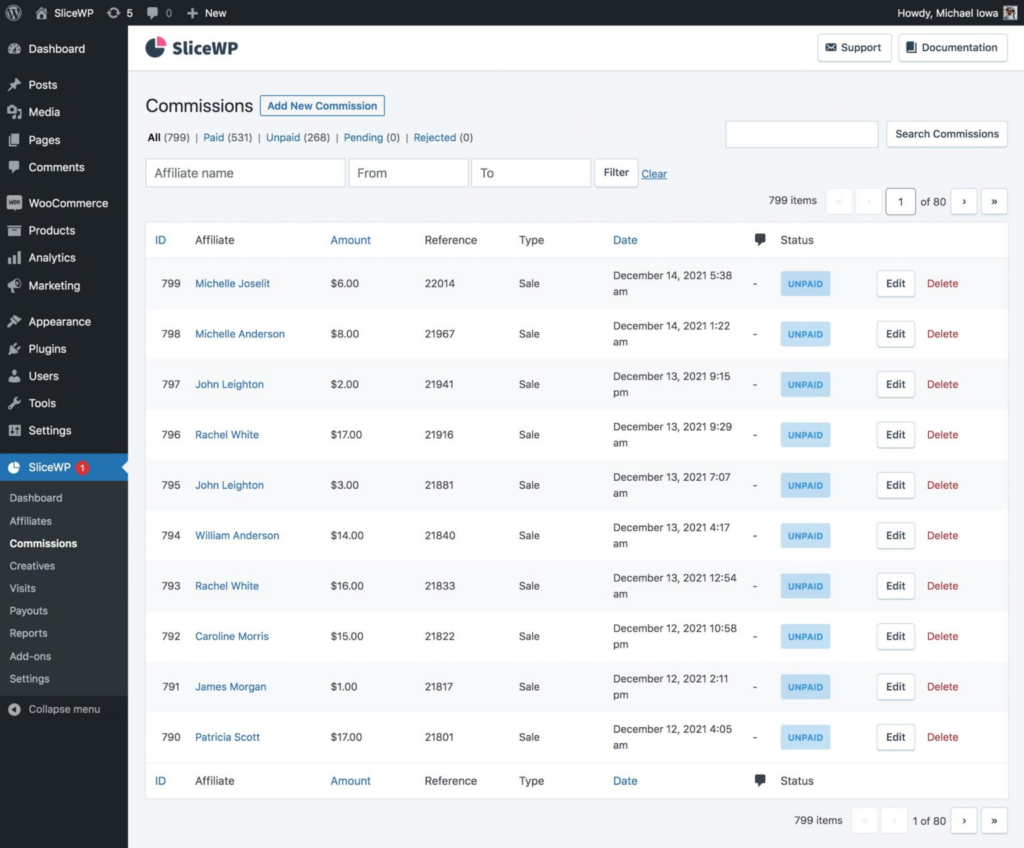
Need a good bird's eye view of your program?
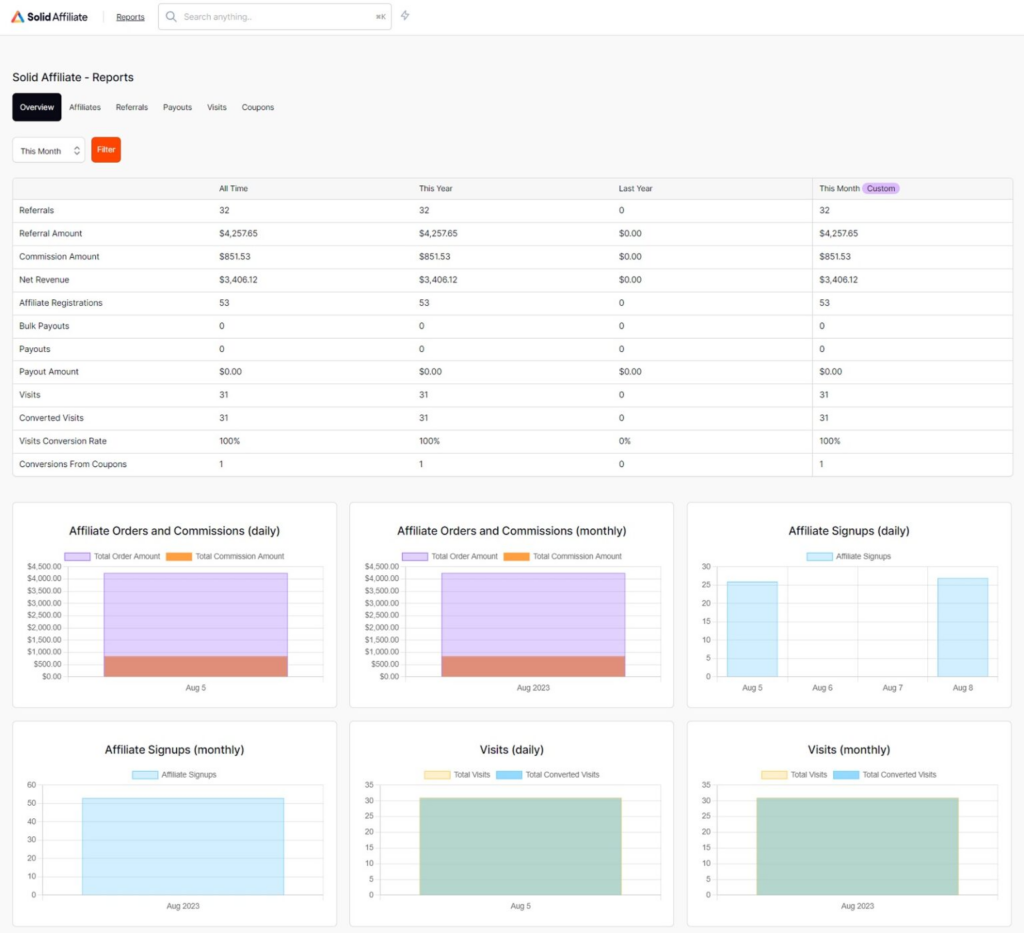
How about drilling down into the details?
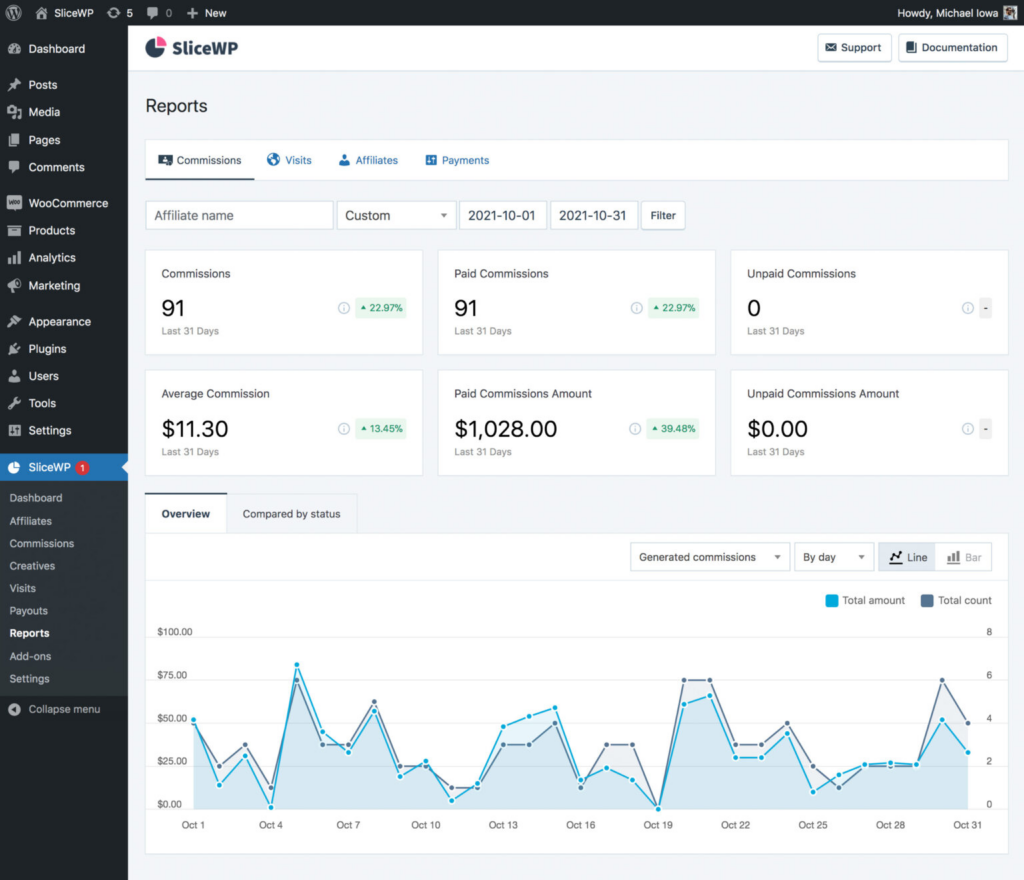
The point is you should not have to struggle to see what's going on in your affiliate program. But the details do matter, so you should also be on the lookout for these features:
- The ability to track affiliate performance by marketing campaign, promotions, coupons, etc. Otherwise, how are you going to figure out what works?
- The ability to group affiliates arbitrarily and then track their activity as a group. This will help you figure out whether you should put your affiliate marketing energy into bloggers versus other online stores versus Facebook influencers, etc.
- The ability to track affiliate performance by products or product categories, as some types of products may be better suited for affiliate marketing than others.
Ultimately, your success or failure in running your affiliate marketing program will boil down to your ability to manage it. But you can't manage what you can't see, so don't settle for anything but the best affiliate reporting system.
Dispute Reconciliation
This may seem like an odd detail to tuck in as a major requirement for an affiliate plugin but stop and think about any of the payment or account disputes you've had over your lifetime. Just one dispute can snowball into a giant waste of time. And if you combine that dispute with poor record-keeping, well, you can end up like this:

We don't have any great screenshots for this because everything goes smoothly for us all of the time! 🙂 Just make sure that when you're testing an affiliate marketing plugin, you test a few scenarios when things do go wrong.
Speaking of testing...
Testing Your WooCommerce Affiliate Plugin Before You Purchase It
We know what we're about to say is going to make you groan. But there's a reason that all these sayings became so popular:
- Better safe than sorry
- An ounce of prevention is worth a pound of cure
- Look before you leap
- Forewarned is forearmed
The fact is, you are much better off discovering weaknesses in an affiliate plugin before you implement it with scores or even hundreds of affiliates.
In a perfect world, affiliate plugin companies would let you test their products in an online sandbox, as we do at https://www.wpallimport.com/try/. This requires no signup or setup and is completely hassle-free.
Unfortunately, none of the plugins on our Best WooCommerce Affiliate Plugins list offer this.
The next best option is a true free trial without requiring credit card information. Only Solid Affiliate offers this.
ReferralCandy, Tapfiliate, and Coupon Affiliates offer true free trials, though you do have to provide credit card information.
The rest offer a money-back guarantee, which is the least convenient option.
Regardless, after you've done your research and have picked out what you think is the best WooCommerce affiliate plugin, we strongly urge you to test it before making a full commitment to it, especially by testing scenarios where things go wrong.
How to Choose an Affiliate Plugin for WooCommerce — Wrap-Up
We know, we know — we just wrote a ton of stuff, and how are you supposed to remember it all?
Luckily for you, we created this simple checklist:
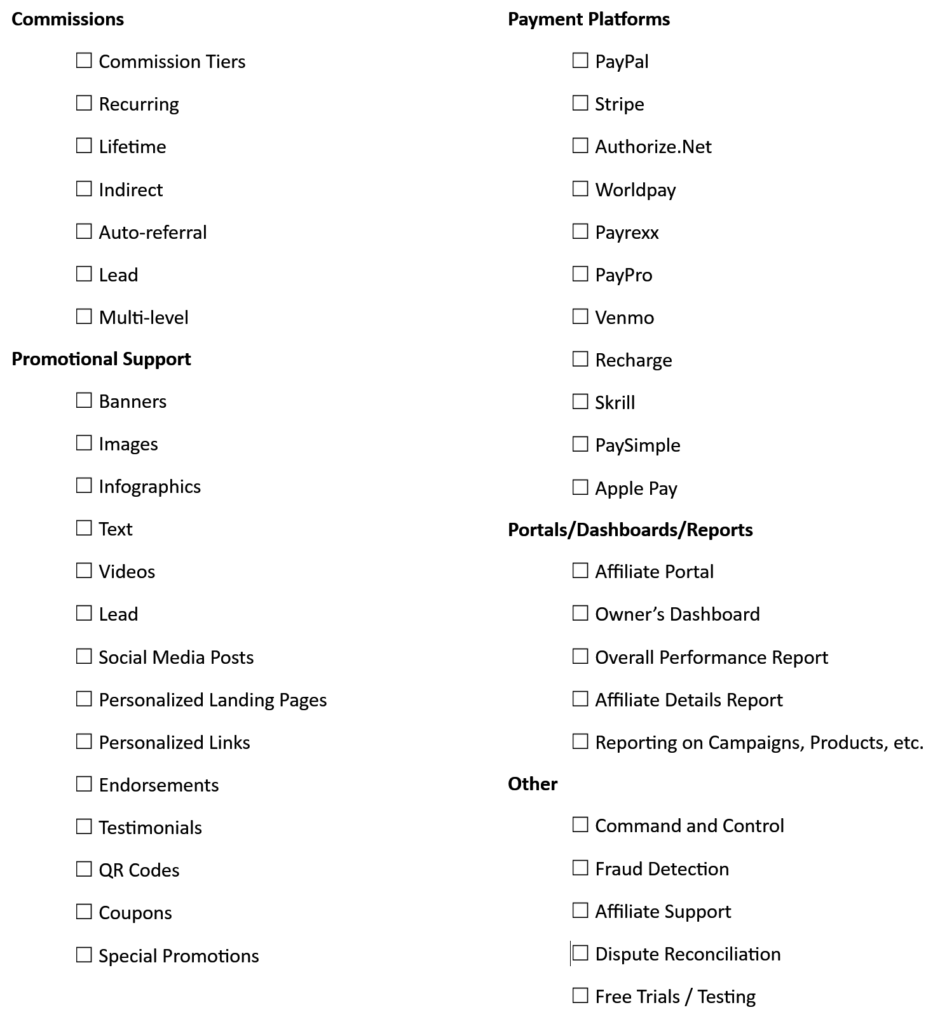
The rest is up to you!
Related Info
Top Affiliate Marketing Statistics for 2023
How to Set an Affiliate Marketing Commission Rate in 6 Steps
How to Find Your Competitors’ Affiliates
Understand the Risks and Vulnerabilities for Affiliate Marketers